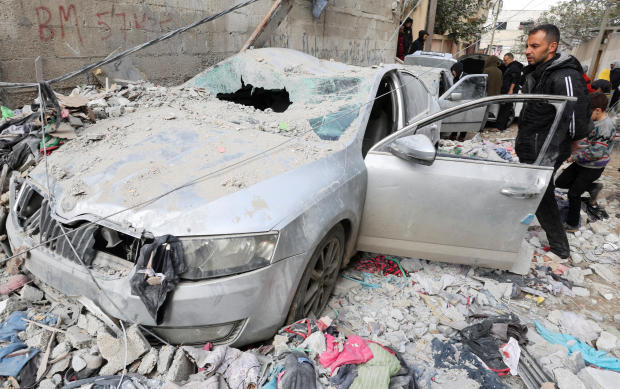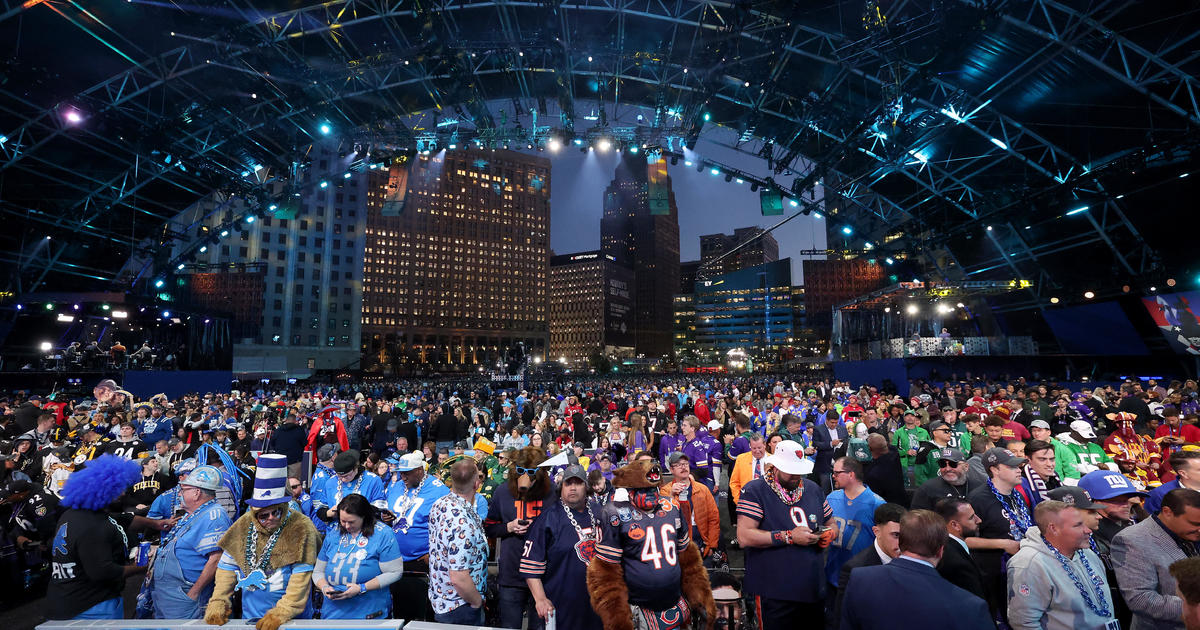Israel's Benjamin Netanyahu indicates war in Gaza may escalate, orders evacuation plan for Rafah
A day after President Biden called Israel's military campaign in the Gaza Strip "over the top," Israeli Prime Minister Benjamin Netanyahu made it clear that the war was likely to escalate. The Israeli leader said Friday that he'd ordered his forces to prepare a plan to evacuate the population of Rafah ahead of an expected Israeli invasion of the southern Gaza city.
Netanyahu made the announcement following international criticism, including from Mr. Biden and his top aides, of Israel's plan to invade the crowded city on Egypt's border.
Israel says Rafah is the last remaining Hamas stronghold and it needs to send in troops to complete its war plan against the Islamic militant group, which he said still had "four battalions" there. But an estimated 1.5 million Palestinians have crammed into the city and the surrounding area after fleeing fighting elsewhere in Gaza, as they were urged to seek refuge there by the Israel Defense Forces.
Netanyahu said a "massive operation" was needed in Rafah. He said he asked security officials to present a "double plan" that would include the evacuation of civilians and a military operation to "collapse" the remaining Hamas militant units.
Biden calls Israel's actions in Gaza "over the top"
Mr. Biden said Thursday that Israel's conduct in the war, ignited by a deadly Oct. 7 Hamas attack, had been "over the top," the harshest U.S. criticism yet of its close ally and an expression of concern about a soaring civilian death toll in Gaza.
The Health Ministry in Hamas-run Gaza said Friday that the overall Palestinian death toll was approaching 28,000, with about two-thirds women and children. The count does not distinguish between civilians and combatants.
On Friday, White House press secretary Karine Jean-Pierre said the president hasn't changed his position on the war and the U.S. wants Hamas to be defeated.
"He's been very clear on that. That is a shared goal that we have obviously with Israel," Jean-Pierre told reporters. "But at the same time … while we have said that, we have been also very clear — the president has been very clear — that they must do so by ensuring that their operations are targeted and conducted in a way that we are protecting innocent civilians."
Israel's stated intentions to expand its ground offensive to Rafah also prompted an unusual public backlash in Washington.
"We have yet to see any evidence of serious planning for such an operation," Vedant Patel, a State Department spokesman, said Thursday. Going ahead with such an offensive now "with no planning and little thought in an area where there is sheltering of a million people would be a disaster."
John Kirby, the National Security Council spokesperson, said an Israeli ground offensive in Rafah is "not something we would support."
The comments signaled intensifying U.S. friction with Netanyahu, who pushed a message of "total victory" in the war this week, at a time when U.S. Secretary of State Antony Blinken was in Israel to press for a cease-fire deal in exchange for the release of dozens of Hamas-held hostages.
Israel continues bombing Rafah
As the White House issued the warnings, Israel bombed more targets in Rafah.
Airstrikes overnight and into Friday hit two residential buildings in Rafah, while two other sites were bombed in central Gaza, including one that damaged a kindergarten-turned-shelter for displaced Palestinians, the Associated Press reported. Twenty-two people were killed, according to Associated Press journalists who saw the bodies arriving at hospitals.
Aid agency officials also sounded warnings over the prospect of a Rafah offensive. "We need Gaza's last remaining hospitals, shelters, markets and water systems to stay functional," said Catherine Russell, head of the U.N. children's agency UNICEF. "Without them, hunger and disease will skyrocket, taking more child lives."
With the war now in its fifth month, Israeli ground forces are still focusing on the city of Khan Younis, just north of Rafah, but Netanyahu has repeatedly said Rafah will be next, creating panic among hundreds of thousands of displaced people.
Netanyahu's words have also alarmed Egypt, which has said that any ground operation in the Rafah area or mass displacement across the border would undermine its 40-year-old peace treaty with Israel. The mostly sealed Gaza-Egypt border is also the main entry point for humanitarian aid.
Shortly after midnight Friday, a residential building was struck near Rafah's Kuwaiti Hospital, killing five people from the al-Sayed family, including three children and a woman. A second Rafah strike killed three more people.
Another overnight strike, in the central town of Deir al-Balah, claimed nine lives, the AP reported. Also in central Gaza, a strike hit near a kindergarten-turned-shelter, damaging the building. It killed five and wounded several more people. Witnesses said shelter residents were asleep at the time.
According to the AP, a woman, carrying a small girl in her arms, shouted as she arrived at the local Al Aqsa Martyrs' Hospital: "What can we do? This is the work of the coward Zionist enemy that chooses innocent civilians. This girl is firing rockets at the Jews? May God help us."
Some of the wounded children were treated while lying on the floor.
More than half of Gaza's population has fled to Rafah, heeding Israeli evacuation orders ahead of the military's continuously expanding ground offensive. Evacuation orders now cover two-thirds of the besieged territory, though an estimated 300,000 Palestinians remain in the northern half of Gaza, which civilians were ordered to leave early on in the war.
Even in areas of refuge, such as Rafah, Israel routinely launches airstrikes against what it says are Hamas targets. It holds the militant group responsible for civilian casualties because it operates from civilian areas.
Israel's four-month-old air and ground offensive - among the most destructive in recent history - has killed 27,947 Palestinians and wounded more than 67,000, local health officials said Friday. The war has driven most people from their homes and pushed a quarter of the population toward starvation.
Mr. Biden has said he continues to work "tirelessly" to press Israel and Hamas to agree on an extended pause in fighting. A truce would be linked to the release of dozens of hostages, out of some 250 seized Oct. 7, and still believed to be in Hamas captivity.
Netanyahu has rejected Hamas' demands for a hostage deal, which includes an end to the war and the release of hundreds of veteran Palestinian prisoners serving long sentences in Israel for deadly attacks carried out as part of the long-running conflict. Netanyahu dismissed Hamas' demands as delusional, even as Blinken said he believes continued negotiations, through mediators Egypt and Qatar, are possible.
Israel's war goals appear increasingly elusive, as Hamas reemerges in parts of northern Gaza, which was the first target of the offensive and has seen widespread destruction. Israel has only rescued one hostage, while Hamas says several have been killed in airstrikes or failed rescue missions.




